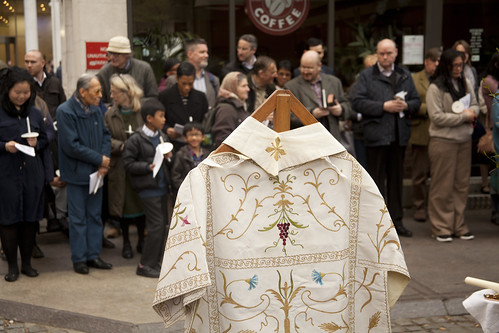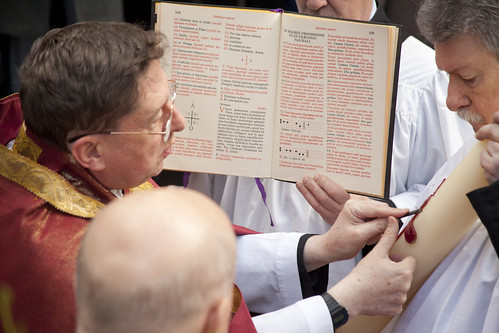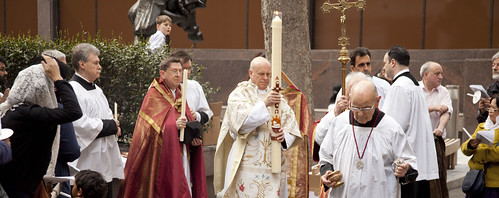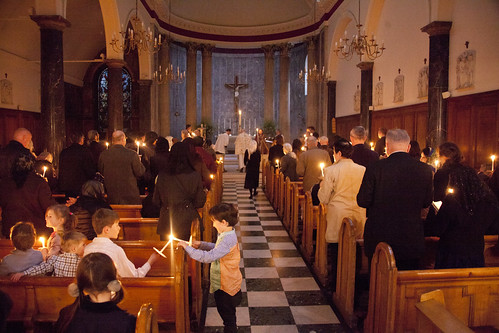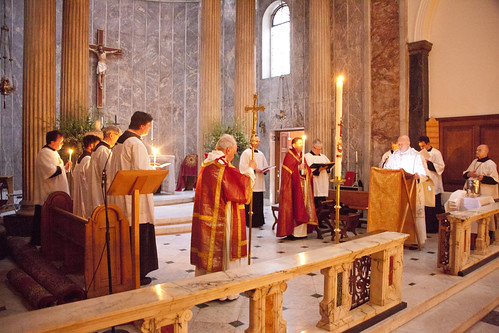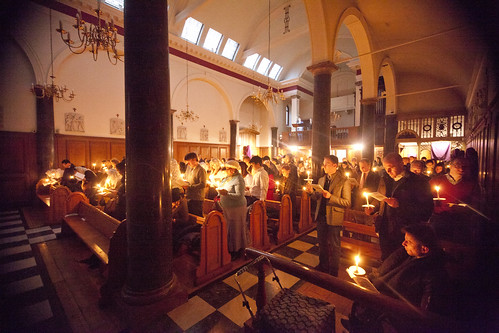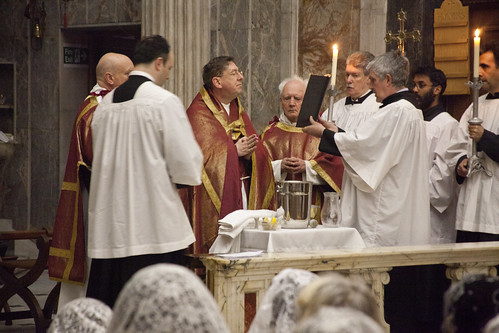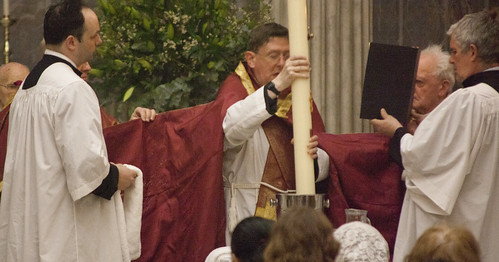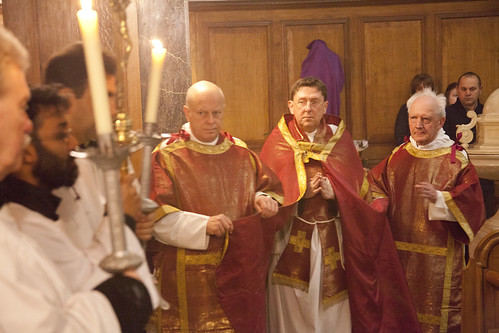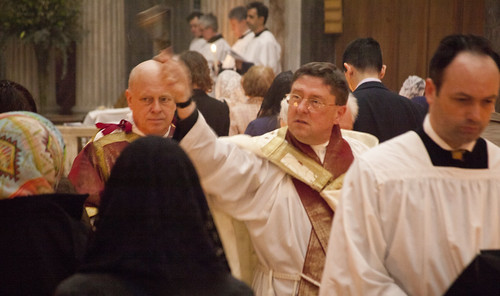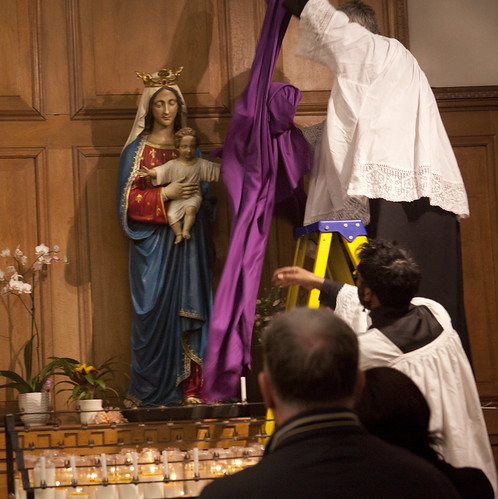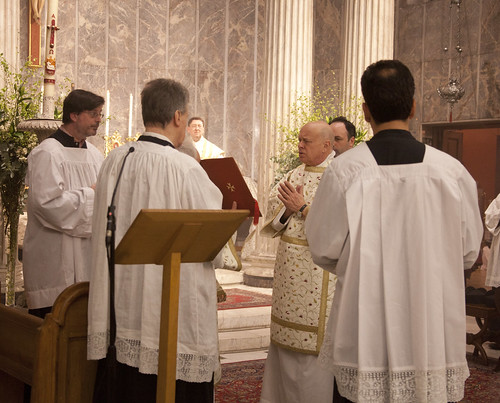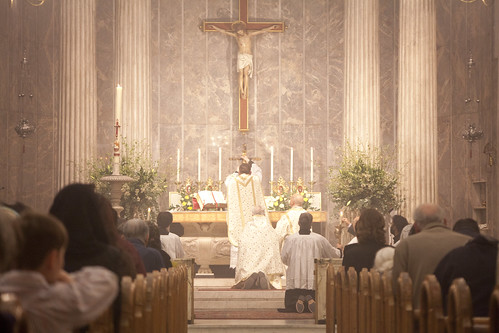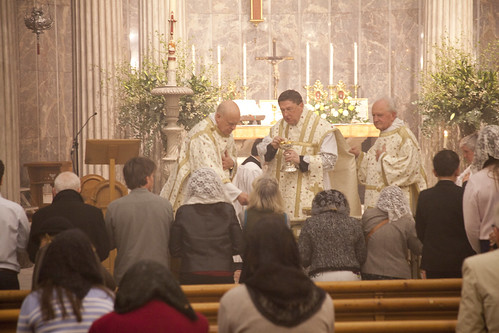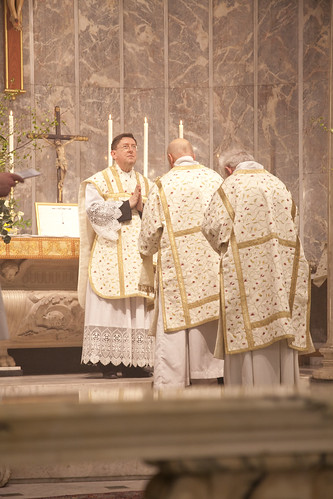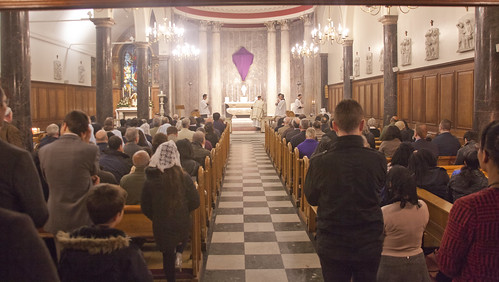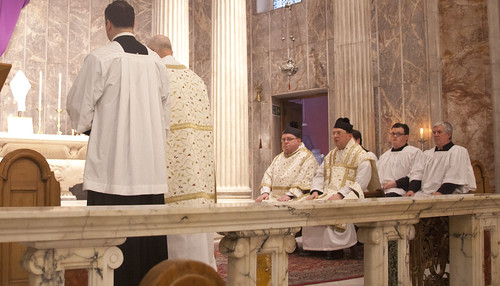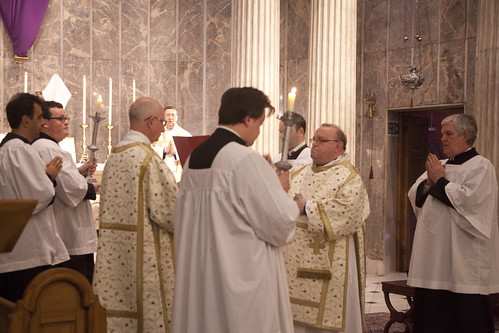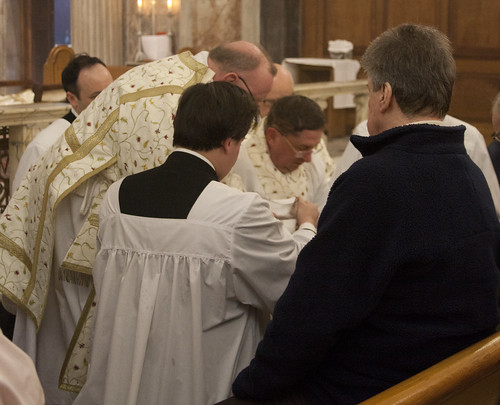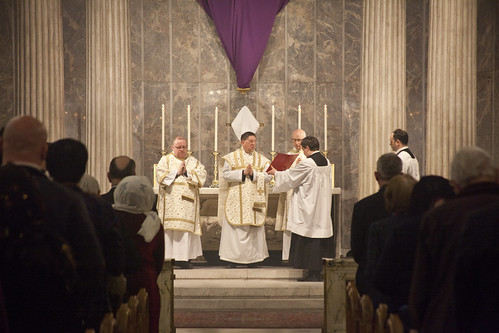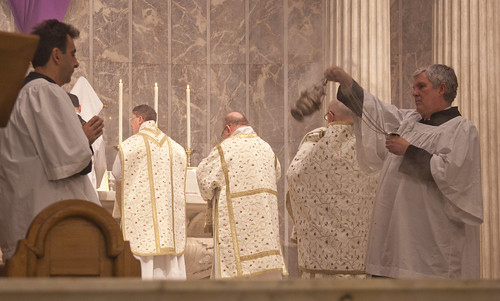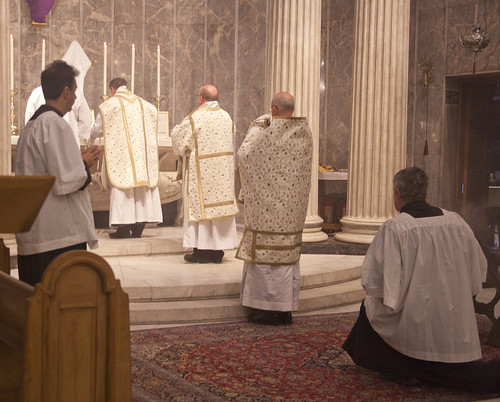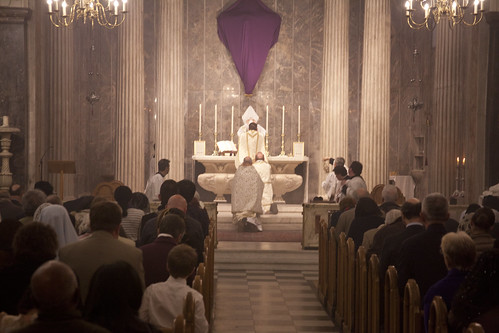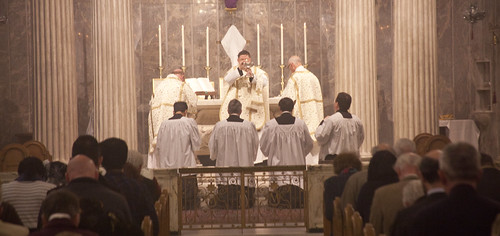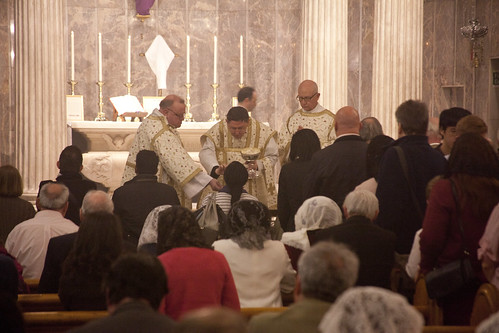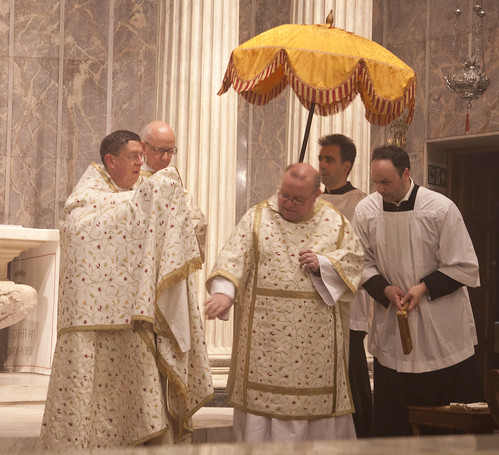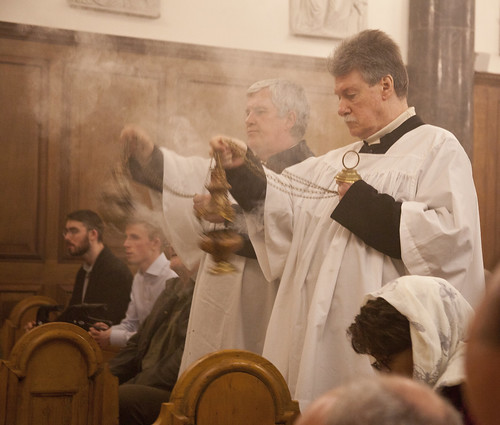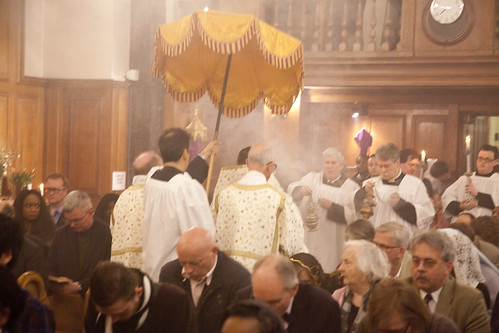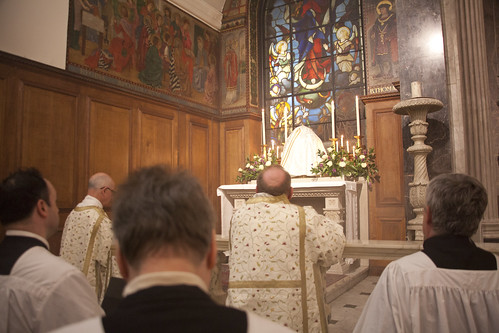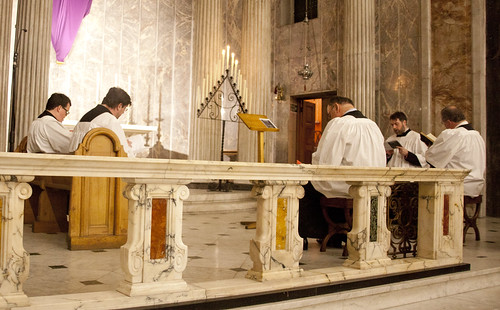Chairman's Blog
Mass in a bottle
This is so wonderful that I want to share it. From Twitter, hat-tip to Dr Francis Young (website):
@SuffolkRecusant
I don't, unfortunately, have any other information about this image.
Support the work of the LMS by becoming an 'Anniversary Supporter'.
Dominican High Mass this Saturday in Oxford
Support the work of the LMS by becoming an 'Anniversary Supporter'.
York Pilgrimage: Sat 29th April
Support the work of the LMS by becoming an 'Anniversary Supporter'.
Hamish Fraser on making the Faith visible
 |
| A passer-by taking a photo of the procession with the Easter Candle at the Easter Vigil in St Mary Moorfields. |
I've been reading Hamish Fraser's Fatal Star, part biography and part commentary on the Church of his day. It was published in 1952, Fraser having been received into the Church some seven years earlier, after an extended period as a Communist activist: including in the Communist secret police in the Spanish Civil War. The edition I have includes extracts from his writings up to the 1980s.
Fraser became a greater supporter of the Traditional Mass, but this isn't the focus of this book. Instead, he connects the Presbyterian culture of his childhood with the untrammelled capitalism which made Communism attractive, laments the failure of the Church to offer an alternative, and points to the message of Fatima as a call to do just this, not (simply) through private devotions, but through penance and conversion of life. He quotes Sister Lucy as saying that the primary message of Fatima is not the Rosary or the First Saturdays, but Penance, and the duties of one's state of life.
His experience of Catholics in industrial Glasgow between the wars was that they offered a watered-down Marxism as a response to the social ills of the Great Depression. After the Second Vatican Council, this was even more the case, and in the case of Liberation Theology, not much watering down was being done. In the meantime, Fraser had discovered the Church's social teaching (Leo XIII and his successors), when researching for a prize essay, and was bowled over by it. He thought it would be fun to win a prize essay on the subject of religion as an atheist, but was no longer an atheist by the time he received it. God has a sense of humour.
Why, he asks, was no one in the Church talking about this social teaching? Or so few that it never percolated down to ordinary Catholics in the trade union movement. Leo XIII framed his teaching precisely as a counter to the rise of anti-clerical Socialism, but it was simply never incorporated into the Church's everyday teaching and practice.
There is a good deal to be said about this historical question, but it also raises a broader practical question for today. People are not going to benefit from what Christ has given the Church to help them be saved if they do not hear anything, or anything positive, about the Church. Most people do not hear Catholics talk about the Faith, and they do not see the Faith manifested in any other way either.
One would never know, from Fraser's complaints about the Church of the 1930s and 1940s, that this was a high point of Catholic evangelisation. It doesn't mean he was wrong: perhaps the Church could and should have been doing even better. But compared to today the Church was visible. Catholic colleagues at work could be identified in all sorts of ways, such as their eating fish on Fridays, which would be impossible today. They were not just identifiable as Catholics by such symbolic actions, however, they had noticeably different attitudes. In the society depicted by the novels of Graham Greene, Evelyn Waugh, and others of that generation, being a Catholic meant that you'd have noticeably different attitudes to a range of ethical issues, including sex outside marriage, abortion, and euthanasia. It wasn't that Catholics were all saints, but their Faith made a difference to way they thought even if they were sinners.
To manifest one's religion in this kind of way today is to set oneself apart not only from non-Catholic society, but from the majority of one's fellow Catholics. Most self-identified Catholics do not attend Mass, nor do they have particularly strong or distinctive views about divorce or contraception. Fraser thought that the Faith was invisible in 1950; today you need a microscope to detect it. When an individual Catholic does do or say something reflective of the Faith, far from being representative of the Catholic community, it is nominal Catholics who will be among those most eager to shout him down. Outsiders don't always have any reason to think that an orthodox Catholic is more characteristic of the Faith than an unorthodox one. Converting to the Faith must seem a little like joining a debating society, perhaps with a view to supporting the less popular side.
It is not easy to know how to handle this situation. What I would at least suggest is that we still need, indeed need more than ever, Catholics in the workplace, in academia, and in the media, who are identifiable as such; we need all kinds of good works to be identifiable as Catholic; and we need ideas identifiable as Catholic in debates about all manner of public and private matters.
Perhaps this is obvious, but there are many who do not behave as though it were true. While I criticise no one who needs to keep the Faith under the radar for personal reasons in the workplace--only they can make that judgement--others make a virtue of it, claiming that they can do more good by being invisible. I'm sorry, but this is wrong. You may have some good influence, but if you succeed in hiding the fact that this influence has any connection with the Catholic Faith, you have also done harm, by creating the dangerous illusion that the wholesome moral instincts and the energy to implement them can as easily spring out of a purely secular source as from grace.
Again, many Catholics can't see a Catholic organisation doing some good work or other without wanting to make it more 'inclusive', either of other Faiths, or of secularists, making it either officially ecumenical or Catholic only in its 'heritage'. Again, this is a way of pretending that good works springing from a living Faith are just humanistic impulses. It is not evangelisation, but a counter-evangelisation.
I don't see the situation for evangelisation in this country as entirely hopeless. If you know where to look, you can find a great many Catholics, deeply indebted to the Faith, serving their fellow citizens in all sorts of ways, which should be making the Faith visible. There is a problem, however, that so many of them are deliberatly trying to keep their Faith under wraps.
To repeat, I don't blame anyone for keeping quiet when colleagues mention the explosive issues of the day, in order to preserve the ability to earn a living for their family. What I am blaming is the attitude that a self-confessedly Catholic organisation, initiative, or idea is ipso facto an embarrassment. If you are embarrassed of Christ, ultimately, he will be embarrassed of you.
For he that shall be ashamed of me, and of my words, in this adulterous and sinful generation: the Son of man also will be ashamed of him, when he shall come in the glory of his Father with the holy angels. (Mark 8:38)
Support the work of the LMS by becoming an 'Anniversary Supporter'.
Children misbehaving in Mass: and an interview in Regina Magazine
I recently completed an interview with Anna-Maria Vesey of Regina Magazine on children at Mass. She said, what I am sure is true, that some parents with small children are concerned that their children won't be engaged at the Traditional Mass, or else that their behaviour won't come up to the expectations of the regulars, and that such thoughts put them off trying it out.
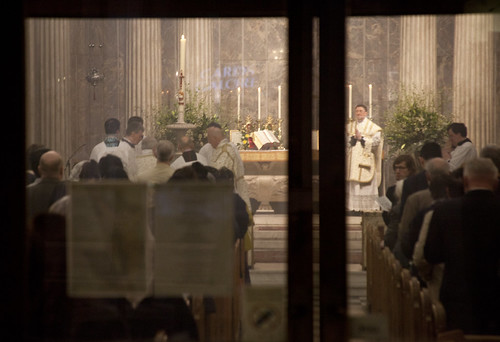 |
| Watching (part of) the Easter Vigil two sets of closed doors away from the action... |
It is impossible to guarantee no one at the Traditional Mass will tick off parents of small children, but I can say this to reassure parents:
There is such a thing as hostility to families and children in some churches, but this is much more common at the Ordinary Form than it is at the Traditional Mass, where there is a noticeably higher proportion of children present. This is partly because of larger families, and partly because the Traditional Mass is sought out by young parents. The sour looks and tut-tutting one gets as a parent trying to manage small children at Mass generally come from people, usually lay people but occasionally priests, who aren’t used to seeing children at Mass. People who go regularly to the TLM are that much more likely to be used to them.
You can read the whole interview here.
Here I want to say more about people ticking off parents at Mass. I've been ticked off a few times, sometimes for the behaviour not of my own but of other people's children. Inside a church at the end of Mass is not the best time and place for a discussion, still less a heated argument, and it is hard to know what to say in response.
I think a good quick rejoinder would be to direct the annoyed person to the celebrant or parish priest. It is for the priest in charge to determine what behaviour is intolerable, and it is legitimate for people unhappy with things happening in church to take their concerns to him. It is the priest who has the authority to ask parents to try a different approach to dealing with their children in Mass, if this really is necessary. He is also in a better position than a parent (or bystander) suddenly confronted with a complaint at the end of Mass (or, still worse, in the middle of it) to have a rational discussion about it.
Other things I'd like to say to those complaining about children in Mass, if it were possible to engage them in extended discussion, would be these.
Have you had the experience of bringing small children to church yourself?
Complaints seem almost invariably to come from people who have no such experience. Parents aren't perfect - we are sinners like the rest of you - but with experience comes an understanding of what strategies parents have been using or could use, why things might be difficult on a particular occasion, and so on.
Did you move from your pew near the children to somewhere further away?
Astonishingly, people complaining about children rarely seem to think of doing this. They expect parents to go to all sorts of lengths, including not coming to church at all, before it occurs to them to walk ten yards to a quieter part of the church.
Have you noticed the efforts parents are making to keep their children quiet in Mass?
The complaints of Mass-goers about one's children are particularly hard to bear when one has been standing up holding a small child, to keep him quiet, for forty minutes at a stretch, or when one has spend more than half of Mass outside with one. Sympathy for others' complaints can be directly correlated with their gratitude for one's own efforts.
Do you think that parents of small children should attend Mass?
What complainants tend not to appreciate is that if the children aren't there, their parents won't be there either, because it is generally impossible for the parents to attend without the children. This will be particularly so at the Traditional Mass, where you can't pick and choose between lots of Mass times. Another aspect is, of course, that the experience of people being extremely rude to them is likely to put many parents of small children off attending your particular church, and perhaps any church, under any circumstances. Either way, you are driving whole families away from Mass. Does anyone think that that is a good idea?
Do you think that small children themselves should attend Mass?
The subtext of at least some complaints about children is that small children should not be there at all. Indeed, hard-core tut-tutters often object not simply to children making a noise in church during Mass, but to small children playing quietly outside the back of the church, under parental supervision, when this has proved necessary. This may sound incredible, but I have experienced it with my own family more than once.
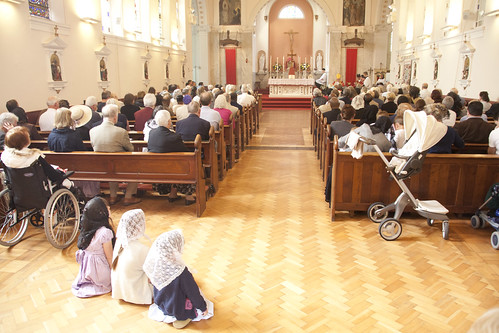 |
| LMS Pilgrimage in honour of St Winefride, Holywell |
It is true of course that small children are not under the same obligation to attend Mass as older children and adults, and it is also true that for certain classes, at certain times and places in the history of the Church, it was common to leave children at home with domestic servants while the adults went to church. (Again, in many historical and cultural contexts mothers have not been expected to leave home for a long time after childbirth.)
However, the attitude of Jesus Christ is emphatic: do not hinder little ones (pavuli in Mark; infantes in Luke) in coming to him (Mark 10:13-16). Again, he did not simply permit, but actually defended the role of children (pueri) in singing at his entry into Jerusalem (Matthew 21:15-16). The High Priests thought they were making too much noise...
Something which surprised me in researching for the FIUV Position Paper on Children were the Old Testament passages demanding the presence small children at liturgical events. For example:
What would actually help? The single thing which would make the biggest difference for children attending any service is the timing. Masses scheduled when small children would normally be eating or sleeping are, for reasons which I need not labour, going to be a lot more difficult for them than other times. We can all appreciate the difficulty of squeezing the Extraordinary Form into an already crowded church timetable, but given the fact that parents with small children will want to attend it, some consideration should be given to this reality. The support of all parishioners in bringing the Traditional Mass in from the margins, and from the least child-friendly time slots, would make a far more positive impact than all the tut-tutting in the world.
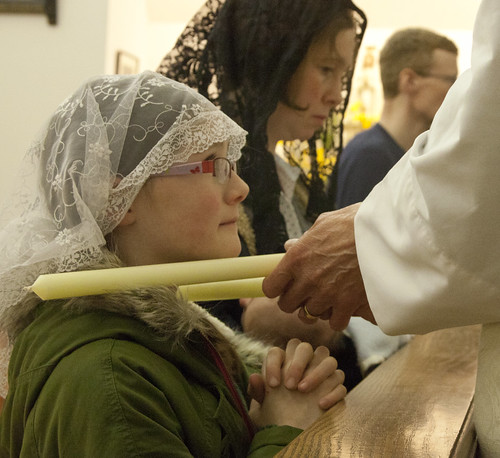 |
| Blessing of throats for the Feast of St Blaise. |
Related: commentary on the FIUV paper on Children and the Extraordinary Form (with a link to the paper);
on Geoffrey Hull on children at Mass.
Support the work of the LMS by becoming an 'Anniversary Supporter'.
Is Pope Francis 'restoring tradition' in the Mandatum?
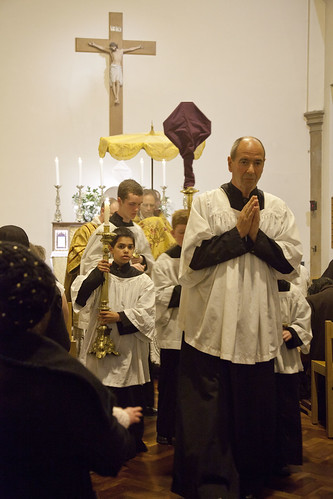 |
| Taking the Blessed Sacrament to the Altar of Repose on Maundy Thursday. |
Reposted from January 2016.
---------------------------------------
Austen Ivereigh claims that in opening the Mandatum to women, Pope Francis is 'restoring an older Tradition'. Claiming the change has 'infuritated traditionalists' (sorry, Austen, I'm not infuriated), he explains:
Yet Francis has been restoring what once was tradition. The custom in the seventeenth century, for example, was for bishops to wash, dry and kiss the feet of 13 poor people after having dressed them and fed them. Nor is there any obligation for the foot-washing to be part of the Mass of the Lord’s Supper.
This is a bit thin as an explanation, so let me fill it in a bit. Because Ivereigh has a point.
It is the rubrics of 1955 and 1970 which say that the foot-washing of Maundy Thursday should happen (a) after the Gospel, (b) in the choir or sanctuary of the church, and (c) to 'viri', men as opposed to women.
N.b. the word 'viri' (plural of 'vir') is only used if you want to exclude women. There is another Latin word for 'men' in the sense of 'people': 'homines' (plural of 'homo'); again, you might expect the gender neutral 'christifideles' (the Faithful) or some such term to be used, if gender was not an issue.
Before 1955, and in accordance with an organically developing tradition going back to the earliest times, the Mandatum took place (a) after Mass was over, after the 'stripping of the Altars' ceremony, (b) not in the sanctuary, and (c) to 'pauperes': the poor. Also, interestingly, as as Ivereigh notes, the number of pauperes was 13, not 12. Indeed, the Mandatum carried out in the context of a parish celebration of the Mass of Maundy Thursday, by a parish priest, was simply a particular case of a wider phenomenon, of Maundy Thursday foot-washing by bishops, abbots, abbesses, kings and queens, lords and ladies, of poor folk. Rubricarius (who knows about these things) tells us in my com-box that the Parish Priest, in line with the wider phenomenon, would have been expected to give these pauperes food, clothing, and money afterwards.
Male foot-washers would have washed male feet, and female washers female feet, as a matter of pudicy. If Ivereigh thinks that a 17th century bishop would have washed the feet of women, he's wrong. (I love the way he implies they did, without quite implying that they did.) Such considerations of pudicy are still relevant in our multi-cultural world: yes, multi-culturalism can mean taking care not to offend people with more old-fashioned attitudes that your own, such as those of American gangsters (bad language warning). What that famous scene from Pulp Fiction demonstrates is that a man touching a woman's feet has an erotic meaning.
I really wouldn't want any priests to 'develop a speech impediment' as a result of washing ladies' feet.
What happened in 1955 was that the Mandatum was made a liturgical act, in the middle of Mass and in the sanctuary, in the form of a literal-minded re-enactment of the scene described in the Gospel of St John (13:1-17). As has often been pointed out, Our Lord washed the feet of His Apostles, His priests: but that is not how it has been understood and imitated in the Latin liturgical tradition. Rather, the command has been understood in a more general sense that the higher should serve the lower, whether the higher is religious or secular, whether the relationship is sacramental or economic. Indeed, one can see in the tradition an application of a specifically lay obligation, to conform secular relationships to the reign of Christ.
As for the 1955 rite, it goes along with a current of thought which understands the liturgy as re-enactment in a way it had never been understood before, a form of antiquarianism. The argument that the 'original meaning' or 'original form' of something should be restored, often on the basis of bad scholarship or simple fantasy, was heard even more loudly in 1970 than in 1955. Along with supposedly authentic vestments and pottery chalices, we have a 'restored' kiss of peace, 'restored' bidding prayers, and a 'restored' offertory procession, and it is common to hear people unable to understand why the priest does not break the Host while saying the words 'He broke the bread', and why the Feast of the Holy Innocents is celebrated before Epiphany, when the event it commemorates took place after. In every case the wisdom of the developed tradition is lost, along with the continuity of what we do with what our immediate predecessors did - usually for at least the last eight centuries, and often for a lot longer.
I said in my last post that the latest change to the Mandatum reflects the results of the contradictions of the 1970 Missal. I should make clear that in this case, the contradiction was inherited from the 1955 reform of Holy Week, for which I have no brief to defend. The contradiction consists specifically in the way the rite uses the sanctuary. The sanctuary is a space for the clergy and their assistants, and the nave is the space for the Faithful. The distinction between the sanctuary and the nave is similar to the distinction marked by the use of Latin, marking out sacred time and space. It is just inappropriate for a dozen lay men to troop into the sanctuary, wearing ordinary clothes, and start taking off their shoes and socks. Adding lay women to the mix doesn't help. The result of the conflict between seeing the sanctuary as a sacred space, and seeing it as a handy 'performance space' for all sorts of activities, results in the disappearance of the former idea. The placing of the Mandatum there wasn't the decisive move, but it was part of a problematic trend.
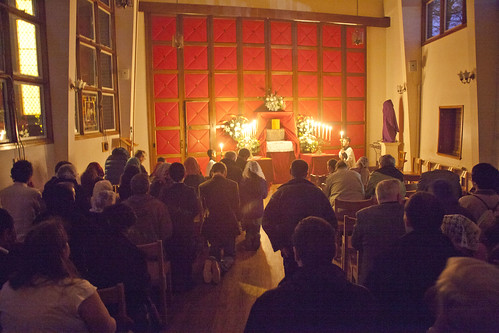 |
| Maundy Thursday with the FSSP in Reading: the Altar of Repose. |
For the meaning of the distinction between sanctuary and nave, see the Position Paper on Altar Girls.
For the problems of the 1955 Holy Week Reform, see the Position Papers on that, Part I and Part II.
Support the work of the LMS by becoming an 'Anniversary Supporter'.
Easter Vigil at St Mary Moorfields
The LMS-organised Easter Vigil service in London, at St Mary Moorfields, was celebrated by Fr Michael Cullinan, with Fr Christoper Basden (of St Bede's, Clapham Park) as Deacon and preacher, and Fr Patrick Hayward as Subdeacon. Cantus Magnus under Matthew Schellhorn accompanied.
Support the work of the LMS by becoming an 'Anniversary Supporter'.
New Book: St John Fisher on the Priesthood
 St John Fisher was the learned and heroic Bishop of Rochester, was the only one of all the Bishops of England and Wales refused to consent to Henry VIII's Act of Supremacy of 1534, the Act supporting to separate the kingdom from the jurisdiction of the Holy See. He was executed on 22nd June 1535.
St John Fisher was the learned and heroic Bishop of Rochester, was the only one of all the Bishops of England and Wales refused to consent to Henry VIII's Act of Supremacy of 1534, the Act supporting to separate the kingdom from the jurisdiction of the Holy See. He was executed on 22nd June 1535.
He had earlier written a book against Luther defending the Catholic theology of the priesthood: ironically, in support of Henry VIII's own work against Luther, to which Luther had made a characteristically intemperate response.
Fisher's work deserves wider recognition, and I am pleased to see this new edition and printing available. It can be bought from Amazon here.
Support the work of the LMS by becoming an 'Anniversary Supporter'.
Maundy Thursday in St Mary Moorfields, London
Above: the Blessed Sacrament is taken to the Altar of Repose. Below: Tenebrae.
Support the work of the LMS by becoming an 'Anniversary Supporter'.
The Mandatum: let's not be hard on Pope Francis
 I see from my stats a small spike of interest in this post: someone must have linked to it somewhere. So I thought I'd repost it. I'll repost a follow-up post on the same subject tomorrow. They both first appeared in January 2016.
I see from my stats a small spike of interest in this post: someone must have linked to it somewhere. So I thought I'd repost it. I'll repost a follow-up post on the same subject tomorrow. They both first appeared in January 2016.
------------------------------------------------
It is tempting to see the decree allowing women's feet to be washed on Maundy Thursday as an indication of an acceleration of liturgical decay underway with Pope Francis, following his breaking of the rule up to now. However, what has happened is no different from what happened under his predecessors.
Bl Pope Paul VI gave in to the pressure of endemic abuse when he allowed the reception of Communion in the hand. But there are other examples too from his troubled reign. One of the most peculiar documents of the Papal Magisterium is his Sacrificium laudis, an Apostolic Letter directed to religious superiors, begging, cajoling, and ordering them to preserve Latin in the Office. You won't find this document in the Acta Apostolicis Sedis, and only in Italian on the Vatican website. The speed of its transformation into waste-paper gives new meaning to the phrase 'dead on arrival'. (You'll find an English translation on the LMS website.)
Pope St John Paul II gave way, again because of the pressure of abuses, on Altar girls. It was he, also, who permitted another set of countries to take up Communion in the hand. It was on his watch, again, that the restrictions on Communion under Both Kinds fell by the wayside - this was forbidden on Sundays, in theory, and for 'large congregations', but the American bishops defied him, and he gave in. It was under him that major investigations of American seminaries and women religious were turned into whitewash, liturgical abuses were established on an industrial scale at the World Youth Days, and being blessed by witch doctors, kissing the Koran, and putting Buddha on altars became de rigeur. Religious sisters not wearing their habits sat right in front of him at a Papal Mass of beatification in Australia in 1995. That day, liturgical discipline was dead.
Pope Benedict XVI allowed Communion in the hand in Poland, where Pope John Paul II never had. Did Pope JP know something his successor did not? It was Pope Benedict who chose to continue JPII's Youth Day Masses, and Assisi ecumenical gatherings, at a moment when it would have been perfectly possible to let both series stop, and merely tried to make them less awful. But he did not continue JPII's series of Instructions lambasting liturgical abuses: he must have realised it was pointless. It was under Pope Benedict that the investigation of the American women's religious lost its conservative mojo: yes, he was the one who appointed João, Cardinal Braz de Aviz as Prefect of the Congregation for Religious, in 2011, with entirely predictable results.
There is, however, an important difference between the actions of these three Popes and Pope Francis. As far as one can tell, Paul VI, John Paul II, and Pope Benedict believed that poor liturgical discipline was a bad thing. Paul VI lamented Communion in the hand and the loss of Latin. John Paul II apparently dislike Altar girls, and condemned abuses vigorously before permitting them. Pope Benedict surely had no sympathy with the ghastly things which were happening in American convents. There is no reason to think that Pope Francis is similarly conflicted when he allows the washing of women's feet on Maundy Thursday.
And another thing: to be crass about it, the Mandatum is not all that important. It happens once a year, and it is optional. It is not an integral part of the Maundy Thursday service - despite its name. Allowing Altar girls and EMHCs and syncetistic pagan rites during Mass are far more serious issues.
Let's not get on a high horse about Pope Francis at this juncture. This is just another step, and not a particularly large one, in the development of the Ordinary Form away from Tradition, and it is not happening because of the personality of the Pope. It is happening because the Novus Ordo Missae of 1970 was unstable. It included a series of compromises which were never going to last. Given the direction of pressure, these compromises were always going to unravel the same way.
This is the real lesson to be learnt. Attempting to shore up the tottering edifice of the Novus Ordo with ferocious-sounding rules has failed. JPII and Pope Benedict didn't manage it, and obviously - obviously - Pope Francis, though not a liturgical 'meddler', is not going to succeed in a project in which he has no interest. If it is collapsing, it is collapsing under the weight of its own contradictions.
Support the work of the LMS by becoming an 'Anniversary Supporter'.





